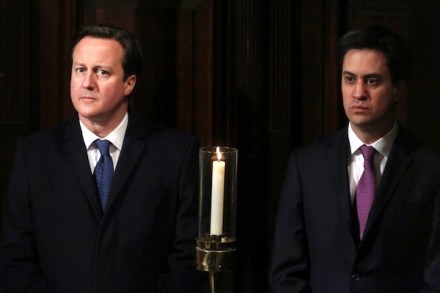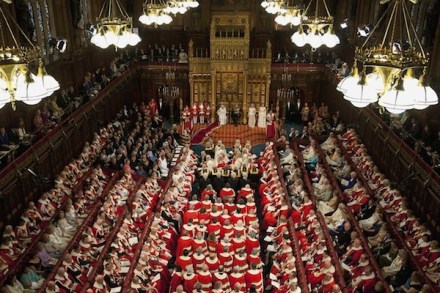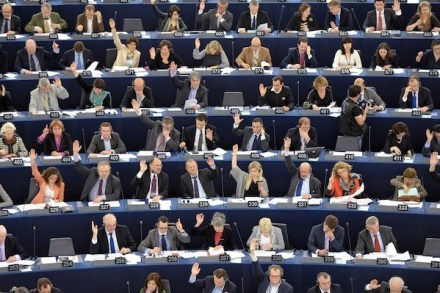PMQs: David Cameron’s attack on Miliband’s U-turns
listen to ‘PMQs: David Cameron’s attack on Miliband’s U-turns’ on Audioboo

Read about the latest UK political news, views and analysis.
listen to ‘PMQs: David Cameron’s attack on Miliband’s U-turns’ on Audioboo


Until now, television coverage of Scotland’s independence referendum has largely been confined to news bulletins and specialist, late night, political programmes unwatched by most of the general public. In that sense, then, the campaign has hardly actually begun. It has not yet found a mass audience. But it will and moving the campaign to prime-time will change it too. That process began last night as STV broadcast the first episode of a three part documentary titled Road to Referendum (viewers in England can watch it here). It offered a potted political and social history of Scotland from 1945 to 1974. (The next episode will focus on the Thatcher Dragon and

That Labour wouldn’t scrap the Coalition’s cuts to child benefit for higher earners isn’t a surprise. It is just one of the many admissions that the party will need to make in the next few years about policies it has bitterly opposed. This week’s admissions that the party couldn’t safeguard winter fuel payment and that it will also introduce a cap on AME welfare spending don’t just represent an attempt to face up to reality, and to show voters that it is prepared to do so. They are also an attempt to see how far the rest of the Labour party can be pushed before the open revolt that everyone
So peers have backed the second reading of the marriage (same sex couples) bill, and against an amendment from Lord Dear calling for the legislation to be dropped. Dear’s attempt to kill the bill was defeated 390 votes to 148, and the second reading passed without a vote. I’ve blogged before that the House of Lords may yet prove to be a more liberal place than it seems on this issue, but those in favour of gay marriage shouldn’t breathe a sigh of relief just yet. The defeat for Dear’s amendment is a blow for opponents of equal marriage, but committee stage and report stage will offer plenty of opportunity

In April’s local elections, only one in three of those eligible to vote actually did so. What proportion of those voters were women? It’s difficult to get an exact percentage, but in most UK elections, women account for just under half of the turnout. In general elections, female turnout is just over 60 percent. Bearing that in mind, it might seem incredible that 100 years ago today, one woman died so that the rest of us could vote. On the day of the Epsom Derby – 4th June 1913 – Emily Wilding Davison ran out in front of the King’s Horse, a three-year-old gelding named Anmer, and died four days later


Mike Hancock last night resigned the Lib Dem whip to fight a court case that includes serious allegations about his conduct. He resigned after a meeting with the chief whip and the party’s deputy leader Simon Hughes about the claims, which he strenuously denies. A party spokesman said last night: ‘Mike Hancock strenuously denies the allegations made in the civil case and intends to clear his name in court.’ But as The Spectator reported, the party has been aware of allegations about Hancock’s behaviour for a number of years. In March, Julie Bindel outlined the leadership’s reaction to a complaint from a constituent: ‘Nick Clegg received a written complaint about the

You just can’t keep Michael Gove down. After beating a very public retreat by u-turning on plans to replace GCSEs earlier this year, he’s announced today the all-new I-level qualifications. I-Levels will be graded 1-8 — with a current A* roughly equal to a 7 — and will take on much of his English Baccalaureate plans, including a greatly reduced significance on coursework and limited resits. The Baccalaureate was a rare defeat for the most fervent of cabinet ministers. Back then, he told the Daily Mail his exam reforms were a ‘step too far’, but it now appears Gove was still determined to get his own way. Following the GCSE

Today’s row about Accident and Emergency has little to do with the issue itself, and far more about one party trying to prove a point about the other. Those rows are the most vitriolic, the most hard-fought, and to the outside world, the most pointless. The King’s Fund today finds waiting times are at their worst level for nine years. What’s going wrong? Each side has its own theories. But what’s significant is that each side is trying to use this row to steal that coveted ‘party of the NHS’ title. This was abundantly clear from Andy Burnham’s response to the report, written in what appears to be a spitting
Lib Dem MP Mike Hancock has resigned from the party to fight ‘very serious allegations’ about his conduct. He took the decision to do so after a meeting with the chief whip. The party this evening released a statement saying: ‘Mike Hancock has chosen to resign the party whip while he defends himself against very serious allegations in a High Court civil action. Mike Hancock strenuously denies the allegations made in the civil case and intends to clear his name in court.’ In a letter to party chief whip Alistair Carmichael, Hancock wrote: ‘I can assure you that I will continue to vigorously defend my position and that I completely

So, just so we’re clear about this: people pretending to be lobbyists appear to be able to persuade parliamentarians to do their bidding (for cash, natch) and this therefore justifies introducing a statutory register of lobbyists. You need no diploma in cynicism to perceive that this is aimed at protecting stupid and greedy politicians rather more than it is a serious attempt at “regulating” lobbying or access to politicians. It’s a means of helping MPs avoid embarrassment. Now they can check to see if the people paying them are real lobbyists! Result! Which is fine (and the coalition gains bonus Urquhart points for using the measure to stiff the Trades

David Cameron’s Commons statement today contained two blunt warnings. In a significant escalation of the argument over communications data, he warned that ‘we will suffer’ if we don’t make progress on the matter. He also declared that not intervening in Syria could boost extremism and mean that the situation there becomes a ‘tragedy for us too’. On communications data, I suspect that there’s a limit to how much progress he can make with his coalition partners. The vibe from the Clegg camp is that they have no desire to back down on this issue and feel that many of their critics are being opportunistic post Woolwich. However, it was Cameron’s

This morning, the government’s plans for a register of lobbyists were ‘ongoing’. This afternoon, they’re well on their way to becoming law. Number 10 has announced that it will be bringing forward a lobbying bill after all, and before the summer recess. Next time we hear the word ‘ongoing’, perhaps we won’t all be so cynical about a bill’s trajectory. Ministers have clearly decided to use a scandal about lobbying to crack down on the influence that trade unions hold over the Labour party, which is a non-sequitur. The weekend’s allegations were about MPs and peers behaving badly, not trade union influence, and the government may find that its desire

Ed Balls’s speech today is significant for two reasons. First, it implied that a Labour government in 2015 would not spend more on current spending. But, rather, it would borrow more to fund higher capital spending—what Gordon Brown used to calling ‘borrowing to invest’. This, I take it, means that a 2015 Labour government wouldn’t introduce the five point plan for the economy that Balls has previously outlined. The second was the announcement that Labour would stop winter fuel payments to higher and top rate taxpayers. This will save about a £100 million a year, which is hardly enough to give Labour a reputation for fiscal rectitude. But it does


David Cameron is giving a statement in the Commons this afternoon on, among other things, the Woolwich killing. He may well find himself answering questions afterwards about whether the government is planning to resurrect the Communications Data Bill, after a fierce debate in recess over whether it would have made any difference to the security and police services ability to stop the attack or to the investigation in the aftermath. The Lib Dem line remains that the party will not allow this legislation, and will only consider the very narrow issue of IP addresses. But there have been some interesting negotiations taking place behind the scenes, I hear. One is

Sleaze scandals will crop up in politics from time to time, but what makes the latest round of allegations particularly damaging is that the government has had two opportunities to at least address faltering public mistrust in politicians, and hasn’t. Those pushing for the power to recall MPs and a register of lobbyists have had rocket boosters fitted to their campaigns in the past few days, and inevitably those who appear to have either blocked or at least dragged their feet on these two policies are now facing criticism for doing so. This morning, Francis Maude insisted that the register of lobbyists wouldn’t have stopped the alleged behaviour reported over

Say at least this for those twin gadflies Douglas Carswell MP and Daniel Hannan MEP, they are optimists in a political scene often dominated by a certain brand of dreary pessimism. Their faith in the bracing refreshment of a reformed democracy is as palpable as it is touching. Their article in today’s Telegraph, repeating their long-pressed arguments for open primaries and recalling errant MPs. Neither idea is without merit. Even so, it is hard to avoid the suspicion that neither measure would have quite the transformative impact Messrs Carswell and Hannan suggest. They argue, for instance, that open primaries would put an end to safe seats. And they insist that

Ed Balls has had plenty of warning about how politically dangerous this month’s spending review will be for him. James reported in April that George Osborne planned to use the settlement (when he eventually gets it) to prod the Labour party. But perhaps it’s also the party’s inability to make polling hay from the Tories in crisis over the past month that has provoked not one but two big policy speeches from the Labour leadership this week. The concession that Balls will give in today’s speech about universal benefits no longer being automatically justifiable has attracted the most attention. The Shadow Chancellor is expected to say: ‘When our NHS and
Today is not a good day for politics or parliament. The latest, depressing sleaze revelations are only going to increase public cynicism about politics and parliament. It seems that a statutory register of lobbyists will now be coming in. Francis Maude, in a striking shift from the government’s post Queen’s speech position, told Andrew Neil on The Sunday Politics ‘we are going to do this.’ But it is hard to see how a statutory register of lobbyists would stop MPs and peers from doing what Panorama, the Telegraph and The Sunday Times appear to have caught them doing. My instinct is that no set of regulations or regulators will be


Jo Johnson is now in situ, Christopher Lockwood has started his two-year sabbatical from the Economist and David Cameron’s new policy unit is in in place and ready to go producing ideas of how to win the 2015 election. But word is that they’re not entirely overflowing with ideas, and believe it will be tough to improve on the inherited agenda. This is true to an extent, as the Coalition Agreement was pretty radical. Then, ministers wanted to achieve a Moore’s Law-style expansion of Free Schools, elimination of the deficit and reconstruction of a dysfunctional welfare state. Any one of those three would have been more than Labour achieved in
Alas, now we know William Hague has joined the list – and it’s a long list – of British government ministers who do not understand how the European Union works. His idea that national parliaments should demand a ‘red card’ system so they can block unwanted EU legislation is muddled in several ways. First is that, if national parliaments are where EU laws should be vetoed, where does that leave the prime ministers who make up the European Council? Prime ministers – and foreign ministers, and agricultural ministers, and the rest — go to Brussels and put their vote or their veto (when they’ve got one) on the table when
